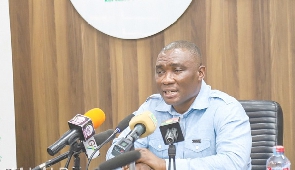Deputy Minister for Lands and Natural Resources in-charge of Mining, George Meriku Duker, has said government is working to diversify the minerals production base and prioritise value addition.
Speaking at the 2023 West African Institute of Mining, Metallurgy and Petroleum (WAIMM 2023) annual industry conference, Mr. Duker said recent geological investigations show the potential for base metals including copper, nickel, zinc, chromium and lithium in certain parts of the country.
To this end, he said, government has established corporate entities to promote and develop the country’s bauxite and iron ore resources, with integrated bauxite and aluminium as well as iron and steel industries. He reiterated that value addition will form the core of these new industries.
“To optimise the benefits from these broad spectra of resources, while planning their discovery and use Ghana is also making a conscious effort to add value to minerals mined in the country,” the deputy minister said, adding that: “Presently, given the level of knowledge of their potential, the country’s bauxite and iron ore resources are the focus for developing an integrated bauxite and aluminium project and integrated iron and steel project, respectively.”
So far, government has established corporate entities – Ghana Integrated Aluminum Development Corporation and the Ghana Integrated Iron and Steel Development Corporation – to promote and see to the development and implementation of these programmes.
“The government of Ghana welcomes private sector proposals for partnership in exploring and developing the mineral potential to create socio-economic value for all,” he added.
Ghana boasts the second-largest reserves of bauxite deposits in Africa besides Guinea, and together these account for 32 percent of the world’s proven reserves. Ghana has also found significant commercial quantities of iron ore and lithium resources in recent times. It is looking forward to leveraging these resources to anchor a new resource-based industrialisation drive.
The Deputy Minister also highlighted the need to create mining and mineral-related support industries that will provide jobs and sustain economic development.
In order to support local businesses, the Minerals Commission has published a local procurement list that stipulates the goods and services which must be procured locally. The fifth edition of the list includes 50 items and was implemented on 1 January 2023.
The main focus of developing this local content framework for Ghana’s mining industry is to create local employment and promote the growth of domestic manufacturing.
The Deputy Minister outlined government’s agenda to transform the economy’s industrial sector to ensure a win-win outcome for both investors and the host country. This includes improving the business environment through regulatory and legal reforms which lead to a reduction in bureaucracy associated with doing business in the country, and will also boost investor confidence.
One of the key ways in which government is working to reduce the cost of doing business in the mining sector is through the Minerals Commission, which has developed the Minerals Cadastral Administration System (MCAS) to assist in simplifying the application for and acquisition of mineral rights. The goal is to mitigate delays in acquiring such rights and make the process more efficient.
The country is richly endowed with mineral resources, with gold accounting for about 95 percent of total mineral production in the country – standing as one of the largest producers of gold on the continent; and in 2021, the sector contributed about 16.48 percent of government revenue and 35.6 percent in terms of total merchandise exports. The sector produced about 2.820 million ounces of gold, resulting in export revenue of about US$5.083billion.
Mr. Duker acknowledged the extractive sector is a capital-intensive one that is deeply connected to global supply chains, making it vulnerable to swings in the global economy.
To build resilience and withstand future shocks, he mentioned that government is promoting more sustainable practices in the mining industry.
Business News of Wednesday, 18 January 2023
Source: thebftonline.com

















